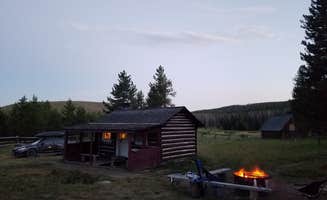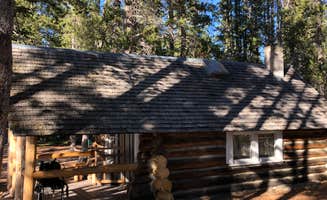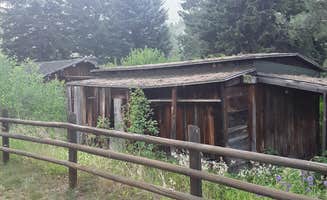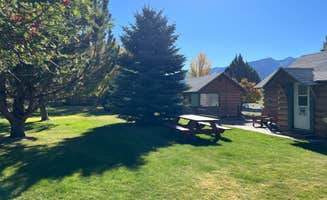Cabin stays around Gibbonsville, Idaho provide rustic shelter within the Bitterroot National Forest and surrounding areas. Most cabins sit at elevations between 4,500-7,200 feet, creating significant temperature fluctuations even during summer months. Winter temperatures regularly drop below zero, while summer evenings typically cool to the 30s and 40s even when daytime temperatures reach the 80s.
What to do
Lake activities: Twin Lakes offers non-motorized water recreation opportunities with clear waters ideal for fishing. According to Katie G., "The mosquitos are terrible so bring lots of deet, and in July it gets to be around 30* F at night so bring lots of extra blankets." The area provides excellent trout fishing from kayaks with fly rods.
Mountain hiking: Mccart Lookout requires a short hike up the mountain but rewards visitors with panoramic views. Miles G. notes, "Well worth the drive and the short hike up the mountain. Beautiful views from all around the tower. Very peaceful and relaxing."
Wildlife viewing: The high elevation cabins provide excellent opportunities for viewing native wildlife. At Twin Lakes, visitors can observe deer, elk, and occasionally moose in nearby marshes and meadows. The region's remote nature means minimal light pollution for excellent stargazing.
What campers like
Remote experience: Twin Lakes Campground provides true wilderness immersion. Madeline K. describes it as "a very off the beaten path, tucked away in the woods, true getaway from the busy city life." She adds that even in July, "you can see snow atop the mountains on the Montana-Idaho border."
Fishing opportunities: Several cabins provide immediate access to fishing. Mark & Kelly G. report at Twin Lakes, "We watched others catch many trout out of kayaks with fly rods." The small lakes and streams throughout the region support healthy trout populations.
Winter activities: Many Forest Service cabins remain accessible year-round for winter recreation. Cross-country skiing and snowshoeing opportunities abound on forest roads and trails. The higher elevation cabins provide access to backcountry terrain ideal for winter exploration.
What you should know
Road conditions: Many cabin access roads require 4WD vehicles, particularly in spring and fall. According to Zane G., the Twin Lakes road "is best traveled with AWD-4WD." Chris J. adds, "It's about a 15 mile commute on a gravel road to get there."
Cabin supplies: Sula Country Store and Resort provides a small market for last-minute supplies. According to Renita B., the store "serves breakfast and lunch" and the staff is "super friendly." The resort also offers more comfortable cabin accommodations with amenities.
Parking limitations: Forest Service cabins typically have limited parking. Dan W. noted at one cabin that "Parking space was limited to one single vehicle without a trailer." Large RVs or trailers cannot access many of these remote locations.
Weather preparedness: High elevation means unpredictable weather conditions. Kat S. describes Twin Lakes as "Remote" with typically "only one other occupied site" making adequate supplies crucial as help may be distant.
Tips for camping with families
Beginner-friendly waters: Twin Lakes provides safe swimming areas for children. Madeline K. describes "Clear water to see the bottom where it's shallow enough. No motorized boats allowed," making it ideal for young swimmers.
Kid-friendly amenities: Andreas on the River RV Park offers riverside cabins with easy town access. Daniel & Vicky C. note it's an "Easy 5 minute walk to town. Great local grocery, bakery, and a few breweries."
Temperature planning: Pack additional layers and sleeping gear for children. Summer nights drop to near freezing even after warm days. According to Katie G., "in July it gets to be around 30* F at night so bring lots of extra blankets."
Recreation options: Several cabin locations offer family activities beyond hiking. The Village at North Fork provides riverside access for water play, while some locations feature fishing ponds specifically for children.
Tips from RVers
Limited hookup options: The Village at North Fork offers full-service RV sites with electricity, sewer, and water connections near cabin accommodations. Most Forest Service cabins cannot accommodate RVs due to narrow, rough access roads.
Access considerations: RVers should carefully research road conditions before attempting to reach remote cabins. Chris J. warns about Twin Lakes, "If your plan is to stay at the campsite for the duration of your visit I would recommend it. But if you are going to explore the area you have to make the 30 mile round trip in order to get to the main road."
Seasonal availability: Many RV parks with cabin options close during winter months. Andreas on the River RV Park operates seasonally from "May 1 to November 1," while The Village at North Fork and Sula Country Store maintain year-round operations for winter visitors.





